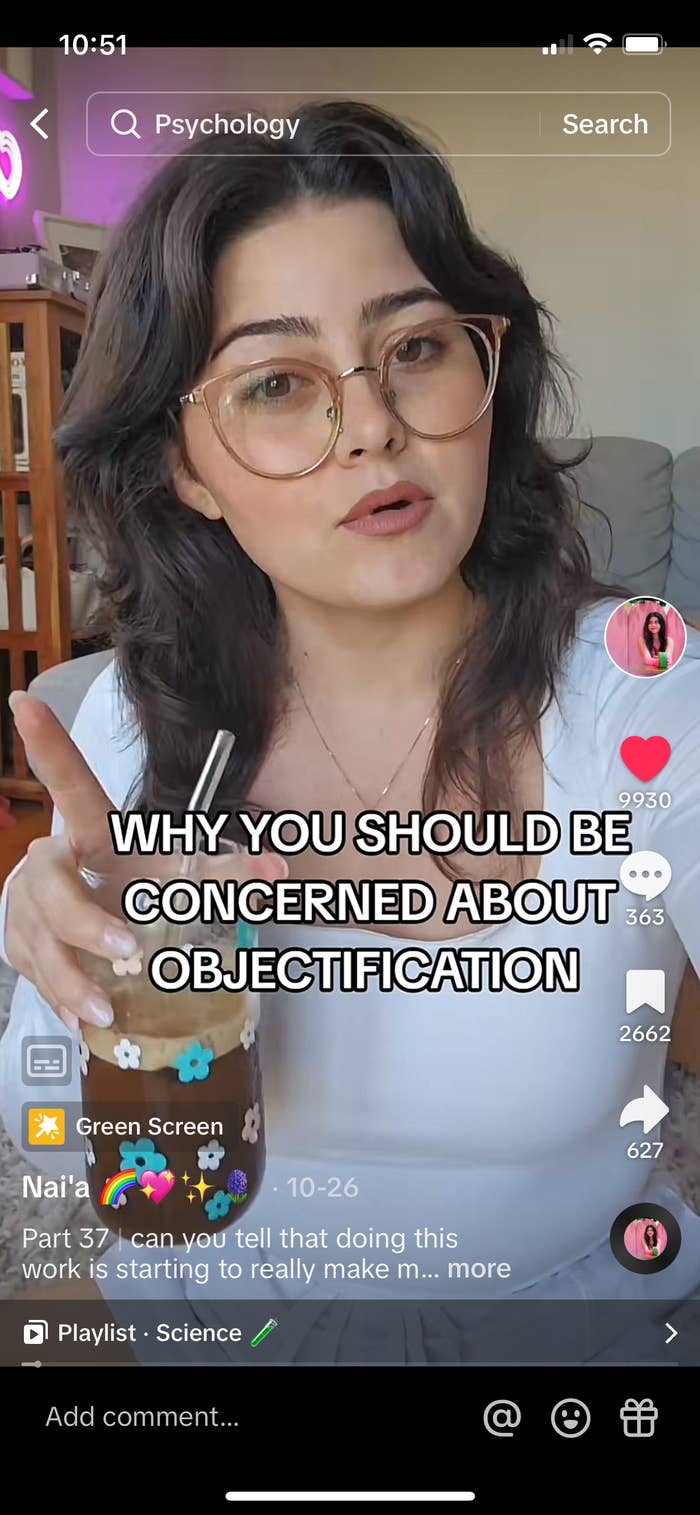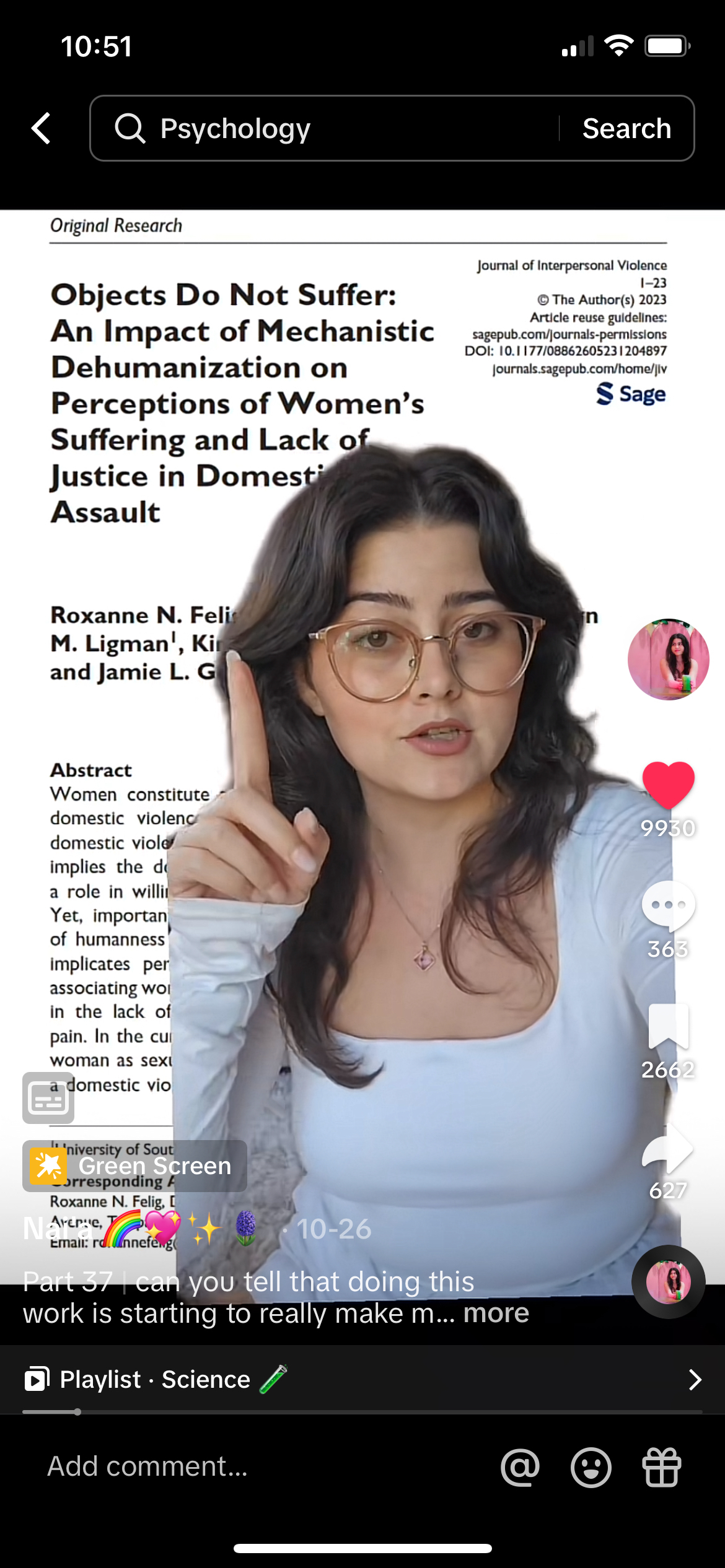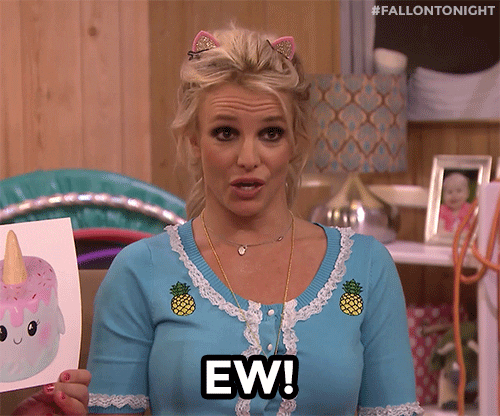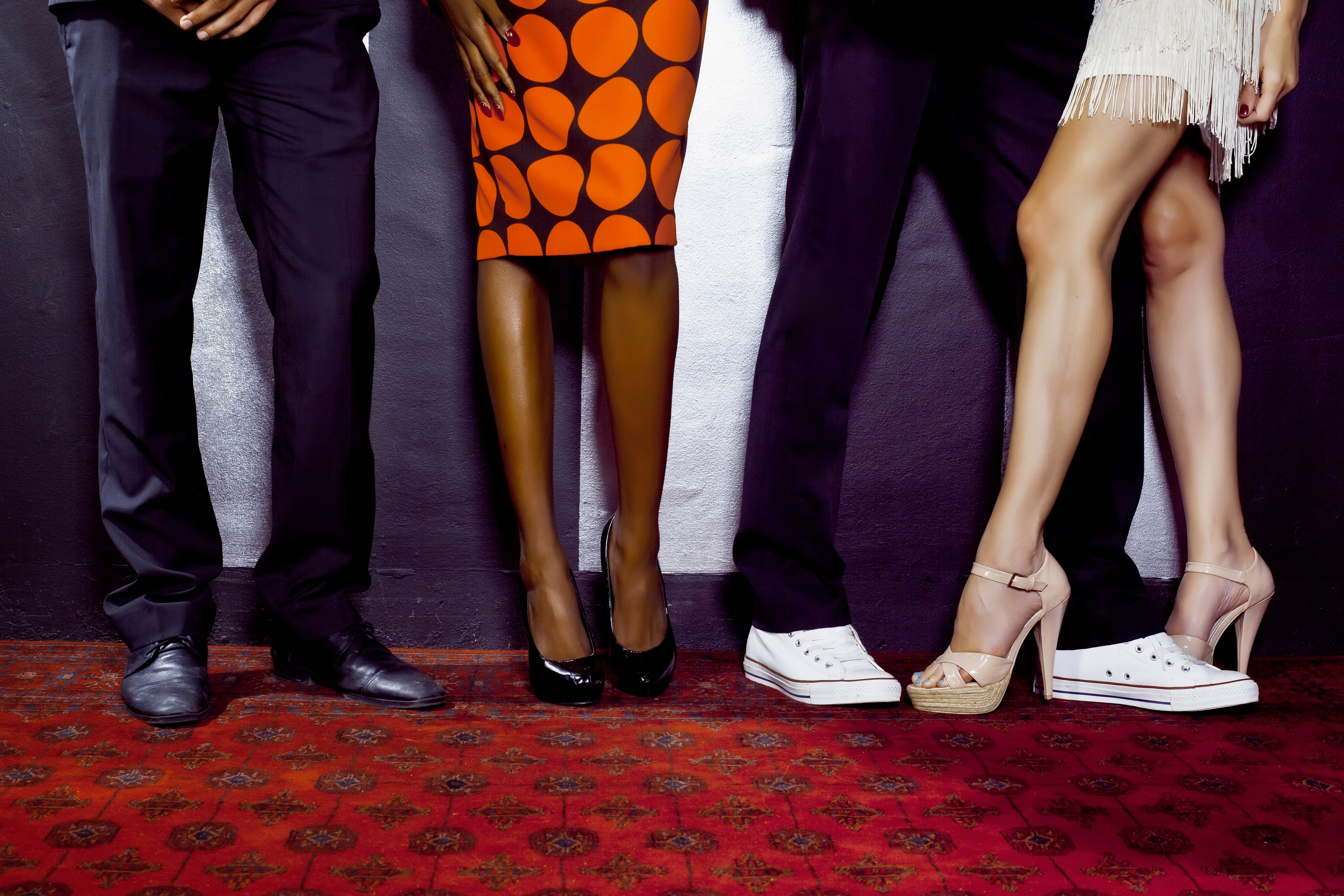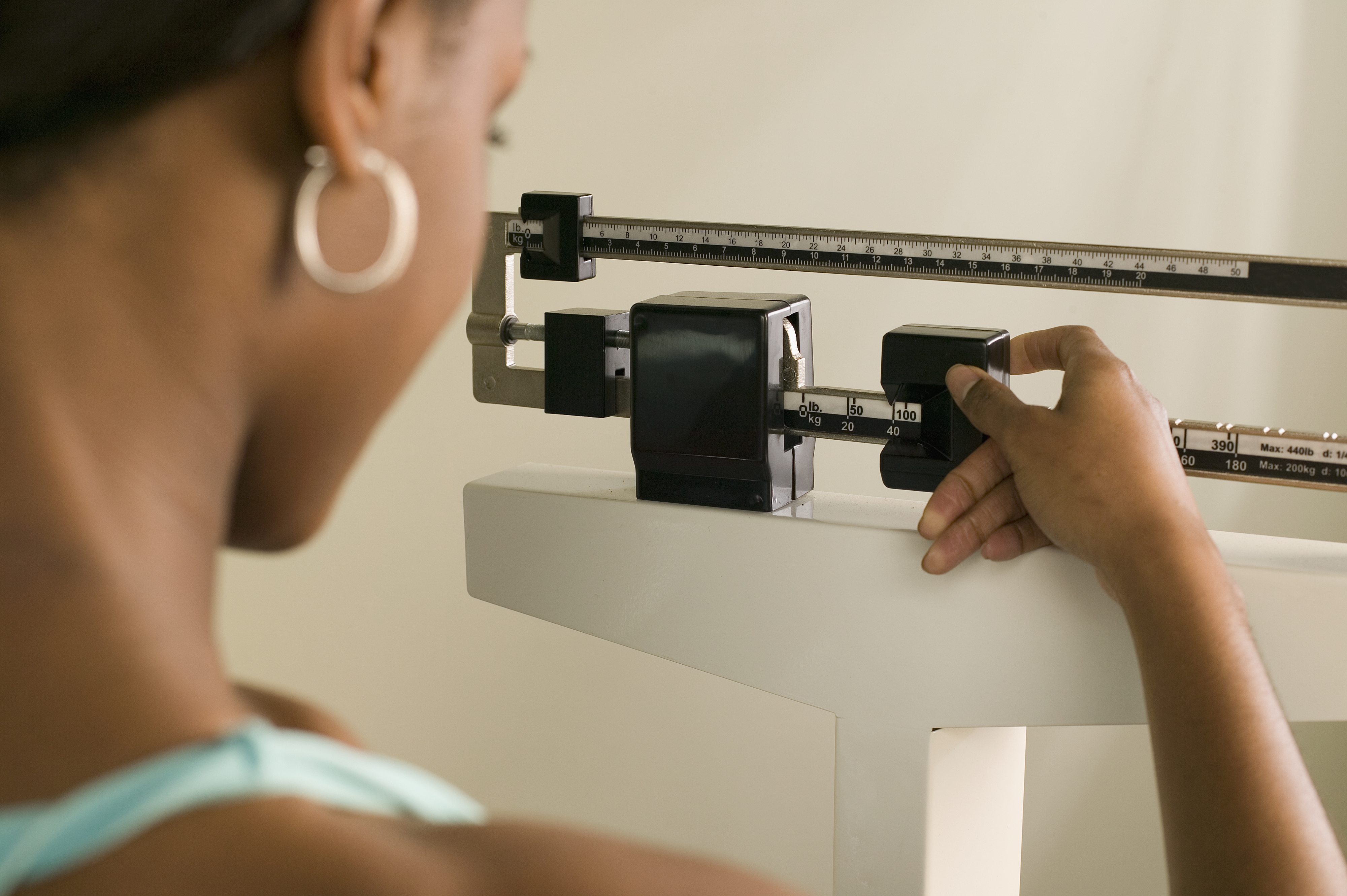It turn out objectification is a very genuine appendage that goes on inside our mastermind — and the consequences can be chilling .
If you’ve ever been objectified, you know that it doesn’t feel great. For me, it brings on a queasy mix of shame and long-burning anger when my humanity is denied in this way. But what if there’s more to it than just feeling bad?
If you ’re not intimate , objectification is when a person is treated as less - than - human and more like an object .
If you ’re a woman , you probably cognise this feeling all too well . Many of us report it beginning even before puberty withgrown men catcalling us as nestling , which I should n’t have to state you is absolutely vile demeanor .
Recently, I came across Roxanne Nai’a Felig (@naia_papaia) on TikTok where she’s been sharing some mind-blowing insights from her research on objectification.
Ina TikToktitled “Why You Should Be Concerned About Objectification,” Nai’a explains howher researchand related studies have found that when women experience objectification, it’s not just a metaphor for the way we’re being treated. Instead, objectification is a very real phenomenon in the brain that causes people to treat us as less-than-human.
In the video, she explains, “We found that when women are objectified in a way where they are equated with literal objects, as opposed to dehumanized in a way where they’re equated withanimals, it predicts reduced perceptions of their capacity to suffer because objects can’t feel pain.”
In her enquiry , Nai’a studied objectification in the specific context of domestic fury against fair sex , and the conclusions are venter - churning .
She says , " We find that that lack of perceived agony predicted thin sentencing for the perpetrator . It also predicted reduce perpetrator blame , because why would someone need to be punish for harming an aim ? "
She goes on to share that a recent neural study on objectification found similar results. “They find that when we are shown sexualized women, we neurologically cannot recognize their perceptions of pain.”
And this phenomenon also holds true when we objectify ourselves. Nai’a has previously done a study inspired by Cardi B’s"A Hoe Never Gets Cold" theorywhere she found that women who ranked higher in self-objectification literally did not feel cold when they should. And neural research has also now been done to support that conclusion.
She concludes her video saying, “The fact that we have neuro evidence, physiological evidence, as well as behavioral evidence that when people are objectified by others or when they objectify themselves, they are actually rendered as a literal object that lacks sensation should really be frightening to you, because we live in a culture where specific groups of people are objectified a lot.”
And this does n’t just apply to women . Nai’a points out that worker , particularly in lower wage problem , are often objectified by employers who ignore their battle and suffering . Makes you see the term " human resources " in an shitty newfangled light .
Watch the full video here:
can you tell that doing this study is originate to really make me depresso?#Psychology#science
I thought Nai’a’s research was equal parts disturbing and fascinating, and TikTok commenters quickly applied her findings to their own experiences with objectification. Exhibit A: Is this why the gyno always calls excruciating pain “just a little pressure”?
Exhibit B: almost everything about the fashion industry.
Or exhibit C: the unfortunate prevalence ofmisdiagnosisandgaslightingin women’s healthcare.
And then there’s this person’s dad who went ahead and said the quiet part loud.
Nai’a told BuzzFeed that commenters are absolutely right in tying these examples to her research, especially as it pertains to women’s health. “I think this all speaks to a historical context that denied women the same humanity as men, and this is especially true for women of color. Plenty of research shows that Black women are dehumanized more than white women, and many modern gynecological procedureswere testedon these women without proper anesthesia.”
" My research recover that dehumanisation is the link between being objectified and not being seen as capable of hurt , so you’re able to see how this is especially problematic for non - white women who are more often dehumanized .
For a great dive into this , I extremely suggestThe Pain Gapby Anushay Hossain , which I am presently reading ! "
She also explained how objectification is defined and presented in her research. “Determining if a woman is being objectified could be inferred from the way she is physically presented, like in some media images where women’s body parts are emphasized as if they’re the only part that matters.”
But that’s not the only way objectification of women can appear. “For example, some research finds that sexualized women are cognitively processed the same way we cognitively process images of actual objects. Findings like this tell us that when women are presented in ways that emphasize their physical appearance, they are more likely to be objectified, and we mean that quite literally — they are perceived less as people, and more as objects.”
I also had to learn more about her research on self-objectification. Nai’a says, “‘Objectification theory’ argues that girls and women grow up in cultures where their bodies are constantly observed by others, more so than men’s bodies, and that this creates an internalization of the observer’s perspective, known as self-objectification.”
" This is , basically , the extent to which you are focused on your external appearance , and it refer to thing like high body disgrace , reduced body cognizance , and cark eating . "
And she told me a little bit more about her “hoe never gets cold” study. “Basically, if we know that self-objectification is related to lower body awareness, maybe that can partially explain this behavior, rather than women being cold but wearing the cute outfit anyway. To test this, we surveyed women waiting in line in front of night clubs and bars on some unseasonably cold nights in 2020 pre-COVID.”
And the results indicated that her hypothesis was correct. “Our findings suggest that when women self-objectify, it is quite literal, and they distance from their body sensations. We found that women low in self-objectification showed an intuitive relationship between skin exposure and perceptions of coldness, and felt colder when wearing less clothes, but women highly focused on their appearance did not feel colder when wearing less clothing.”
" And while this was a merriment , kind of quirky subject area , the implications for this could be very severe . If women are prioritise their show and not feel the consequences , could there potentially be harmful consequences ? "
And she says the dehumanizing and disconnecting effects of objectification should concern us all. “Since objectification involves seeing someone as less of a person and more of a thing, you can imagine it has harmful consequences. When women internalize this, it relates to body shame, anxiety, disordered eating, and sexual dysfunction to name a few.”

